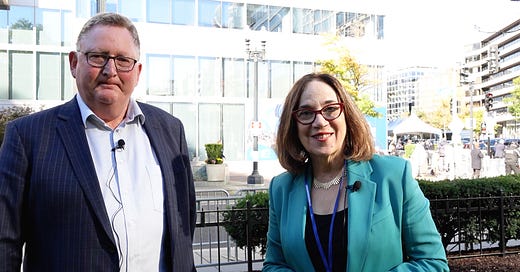New Zealand is known as a country that punches above its weight, an island nation of 5.2 million people whose currency is one of the most traded in the world, meaning policies of the Reserve Bank of New Zealand are also followed closely globally.
Enter RBNZ governor Adrian Orr. Under his leadership the RBNZ was one of the very first central banks to start hiking rates during the pandemic-driven inflation surge. In fact it did its first rate hike in October of 2021, months ahead of the Federal Reserve Fed’s first rate hike in March of 2022.
Now, as inflation falls around the world, the RBNZ again beat the Fed to the punch again cutting its key rate by 25bps on August 14, four days before the Fed made its first post-pandemic move with an aggressive 50bps cut.
So I asked Governor Orr when he joined me during the IMF and World Bank annual meetings if it was more than coincidence when, on October 9, the RBNZ also surprised doing a 50bps cut as well. Did the Fed’s move open the door wider to a more aggressive move by Orr and his team?
No. ”I'm going to disappoint the audience and probably the US Fed, but it didn't influence us. We have our own thorough policy, our own inflation problems, we have a flexible exchange rate that can absorb what other countries are doing,” Orr says.
”We were more happy (about) the fact that our core inflation has been declining,” he stresses. “Price setting behaviour, wage setting behaviour, inflation expectations and now actual inflation are all consistent with being back in our 1-3% target band. So, you know, we don't have to be as restrictive.”
Orr says he expects to see the key rate to be cut over the coming calendar year to get down to 3.5%. ”We've had very low growth, extremely low per capita growth, (low) inflation. You know the central bank has done its job and we can now take our foot off the break and get back to neutral.”
New Zealand is a small, open, export-driven economy, just the kind that tariffs, renewed protectionism, often hits hardest. All the more reason to ask him what he expects new U.S. tariffs to bring to mean for his nation’s economy.
”Tariffs are bad, full stop when it comes to economics, you know,” he says. “We've spent decades learning about the great and good of multilateral trade where someone may be better off, no one worse off, and the tariff world really is a return back to the 70s of protectionism and deadweight costs to economies.”
“China is 30 % of our trade and we're very dependent also on the rest of the world,” he says. What if New Zealand gets caught in a spat between the northern hemisphere and the rest of the world, “and suddenly we're outside of a trade circle,” he adds. “So you know we have to walk carefully.”
We covered a lot more ground, with Governor Orr keeping things lively as he always does with his views and humor, as only a central banker who punches above his weight can do.
Adrian is a 1983 undergraduate of the University of Waikato (New Zealand) and a 1985 Masters graduate (with Distinction) from the University of Leicester (England).
Following his Masters, Adrian remained in the United Kingdom for three years working as a Research Associate and tutor at the City University Business School, in London.
Adrian returned to New Zealand in 1988 to take up the position of Research Economist at the New Zealand Institute of Economic Research before joining the Economics team at the National Bank of New Zealand the following year.
In 1992, Adrian moved to France to work as an economist at the Organisation for Economic Cooperation and Development (OECD). After holding this role for three years, Adrian returned to New Zealand and worked for a short time as a Chief Analyst at The Treasury, before returning to the National Bank as Chief Economist.
Adrian was appointed Chief Manager of the economics team at the Reserve Bank of New Zealand in 1997, providing core economic and policy advice to the Governor.
Between 2000 and 2003 he served as Chief Economist for Westpac Banking Corporation. This was followed by a four-year stint as Deputy Governor and Head of Financial Stability of the Reserve Bank through to 2007.From 2007 until his appointment as Governor, Adrian held the position of Chief Executive Officer at the Guardians of the New Zealand Superannuation Fund. The Fund has won a variety of international awards for investment, responsible investing, and leadership.













Share this post